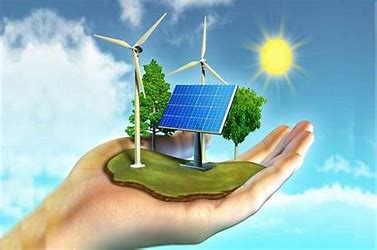
In the face of environmental threats posed by greenhouse gas emissions and climate change, countries
around the world have adopted policies aimed at environmental protection and sustainable
development. In line with this logic, Cameroon has redefined its development policy with the
objective of increasing the production of electricity from renewable sources to 25% and reducing its
greenhouse gas emissions by 32% by 2035. In this regard, the promotion of renewable energies has
become one of the main pillars of this policy. Briefly, renewable energies are energies derived from
natural sources whose rate of replenishment is higher than their consumption rate. They include solar
energy, wind energy, hydroelectric energy, biomass energy, and geothermal energy. The promotion of
these renewable energies presents real challenges not only in terms of politics, economics,
environment, and climate, but also in terms of social aspects. It is based on these challenges that the
Cameroonian government has attempted, albeit timidly, to promote the development of these
renewable energies by providing them with a favorable tax regime. This favorable regime stems from
the 2012 Finance Law, its implementing circular, and Circular No. 001/CF/MINFI/CAB of January 9,
2012, which specifies the modalities for implementing the provisions of Article 128(6) and (17) of the
General Tax Code. However, eleven years after the adoption of these texts, the favorable regime has
remained limited to only one advantageous measure related to value-added tax (VAT), which itself is
confined to two categories of energies. Given the significant national energy deficit and the current
importance of renewable energies, it is urgent for Cameroon to transition from the current limited
favorable tax regime (I) to a holistic approach oriented towards a true investment incentive regime in
this sector (II).
I. The limited scope of the current favorable tax regime
The Cameroonian legislature has defined a favorable tax regime applicable to renewable energies by
introducing an exemption from value-added tax (VAT) on certain goods and products related to these
energies into its legal framework. However, it should be noted that the scope of this exemption is
limited in two respects. On the one hand, the exemption is limited to two types of energy, and on the
other hand, it only applies to certain operational equipment and materials. This is evident from a
combined reading of the provisions of Article 128(17) of the General Tax Code, the implementing
circular of the 2012 finance law, and Circular No. 001/CF/MINFI/CAB of January 9, 2012, which
specifies the modalities for implementing the provisions of Article 128(6) and (17) of the General Tax
Code. According to these provisions, it appears that the exemption exclusively benefits solar and wind
energy. It applies only to specific equipment and materials used for energy capture, conversion into
electricity, and exploitation. These include photovoltaic conversion equipment for solar energy,
mechanical conversion equipment and electromechanical conversion equipment for wind energy. One
wonders why the advantage is limited to these two energies when other forms of renewable energies
listed in the 2011 electricity law are equally important, and when devices and equipment are also
necessary for their exploitation. Furthermore, it is regrettable that the accessories for these equipment
and devices that operate exclusively on renewable energies are not covered by this exemption. Among
these devices, one can mention televisions, radios, and fans, which are widely used by consumers in
rural areas. Does this limitation not overlook the economic and social implications that should guide
such a measure, particularly in terms of facilitating access to essential goods for the most vulnerable?
Such shortcomings dilute the effectiveness of a favorable regime that is supposed to promote such a
crucial sector of activity as renewable energies and therefore appear inappropriate, even unjust.
Hence, the need to adopt a comprehensive approach, not just a simple favorable tax regime, but an
investment incentive regime.
II. The need for a holistic approach for a more attractive regime
Given the limitations of the current favorable tax regime, it is imperative to consider a holistic
approach aimed at creating a more attractive framework for investors in the renewable energy sector
in Cameroon. Such an approach involves expanding the scope of VAT exemption and adopting a
genuine investment incentive regime. Regarding the expansion of the VAT exemption, it would be
wise to extend it to include hydroelectric, marine, geothermal, and biomass energies, as listed in
Cameroon’s 2011 Electricity Law. This would allow renewable energies as a whole to benefit from
such a tax advantage, thereby ending the confinement of the favorable measure to only solar and wind
energies. Furthermore, it is crucial to extend the VAT exemption not only to all accessories of
renewable energy equipment and materials, but also to any device that operates entirely and
exclusively on these renewable energies. The merit of such an approach is to enhance the original
socio-economic impact of the measure by reducing the acquisition costs of equipment, materials, and
household appliances for operators and consumers. Regarding investment incentives, although the
2013 Law on Incentives for Private Investment in Cameroon could cover renewable energies, it is
necessary to define a specific and appropriate incentive regime to promote the production of
renewable energies as a whole. This involves, as in the case of promoting the agricultural sector, the
capital market, and ICT startups, granting companies in the installation and operation phases various
tax reductions, and exemptions from taxes, levies, and customs duties. Such a broad approach is likely
to ensure the genuine development of renewable energies in Cameroon, considering that these
energies strongly contribute to stimulating the economy, creating jobs, reducing poverty, and
protecting the environment.
In conclusion, the promotion of renewable energies in Cameroon suffers from several shortcomings.
These include the confinement of VAT exemption to certain energies and a few tools for exploiting
them. This highlights the need to consider a holistic approach aimed at defining a genuine investment
incentive regime. This will help foster the development of these renewable energies, which are the
focus of the energy transition by 2030.
